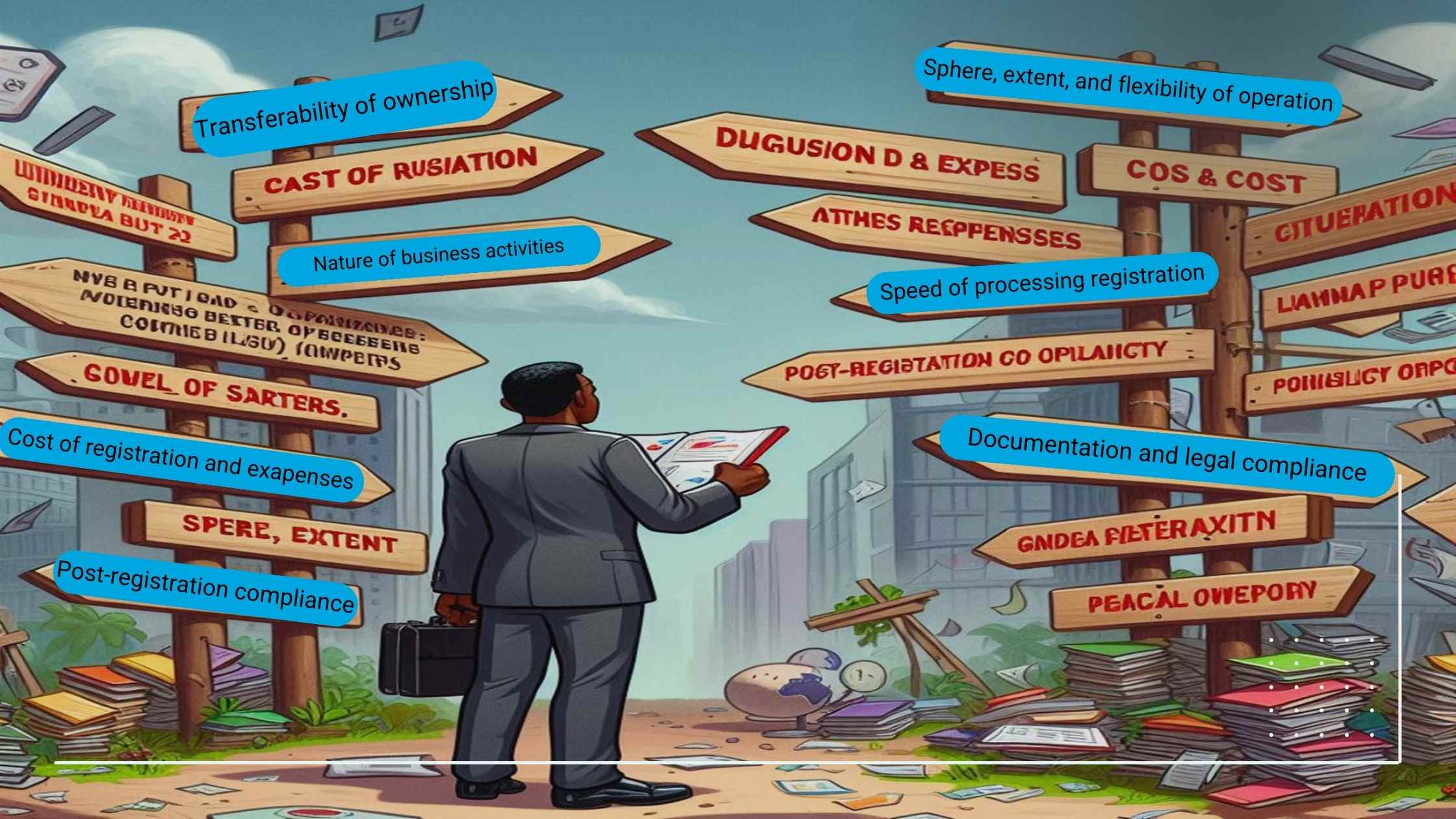The Definitive Guide to Structuring Your Business in Nigeria

by Counseal Team
Updated April 15, 2024

Choosing the right business structure is a critical decision when setting up your venture in Nigeria. The entity you select will determine your legal, financial, and operational obligations, so it’s essential to understand the options available and the factors to consider.
In this comprehensive guide, we’ll walk you through the common business structures in Nigeria, their advantages, and how to choose the best fit for your startup. Whether you’re a budding entrepreneur or an established business owner looking to restructure, this article will provide the insights you need to make an informed decision.
Factors to Consider When Choosing a Business Structure
Before diving into the different business structures, let’s examine the key factors that should influence your choice:
- Nature of business activities: Your industry and operations will dictate the financial and operational responsibilities you’ll need to handle.
- Cost of registration and expenses: Each business structure has varying registration costs, so choose one that fits your budget.
- Speed of processing and completion of registration: Consider how quickly you need to get your business up and running when selecting a structure.
- Documentation and legal compliance: Some businesses require additional licenses and permits from government agencies, such as NAFDAC or the Central Bank of Nigeria.
- Post-registration compliance and regulatory supervision: Understand the ongoing obligations and oversight your chosen structure will entail.
- Sphere, extent, and flexibility of operation: Ensure your business entity enables rather than limits your growth and innovation.
- Transferability of ownership: If you plan to pass on or share ownership in the future, opt for a structure that allows succession and transfer of shares.
- Financial requirements: Define your current and projected cash flow to determine which entity can sustain your business.
- Profit sharing: Consider whether you want to distribute profits among partners or shareholders or keep them for yourself.
- Government policies: Be aware of tax, licensing, and other regulatory policies that may affect your chosen structure.
- Risk and liability: The extent of personal liability for debts and other obligations varies depending on the legal structure and size of your business.

Benefits of a Proper Legal Structure for Your Business in Nigeria
Opting for a structured business entity offers numerous advantages, including:
- Easy access to loans, grants, and investors
- Continuity of business beyond one’s lifespan
- Streamlined business administration
- Separation of personal and business finances
- Recognition as a body corporate with a separate legal identity
- Protection of the owner from business risks and liabilities
- Exclusive rights to corporate names
- Access to a skilled workforce
Common Types of Business Structures in Nigeria
Now, let’s explore the most common business structures in Nigeria, as governed by the Companies and Allied Matters Act, 2020 (CAMA 2020) and regulated by the Corporate Affairs Commission (CAC).
1. Companies
A company is a legal entity formed by a group of people to run a business, with profit maximization as its primary goal. Upon formation, a company gains a separate legal identity and can operate independently of its shareholders.
Companies can be categorized as:
- Private company limited by shares (Ltd): Membership is restricted to 2–50 members, and their liability is limited to their shareholding.
- Public company limited by shares (PLC): Membership is unlimited, with a minimum of two members. The public can subscribe to its shares, and members’ liability is limited to their shareholding.
- Unlimited Company (Ultd): Members’ financial liability upon winding up is unlimited, unlike limited companies.
- Company limited by guarantee (Ltd by Gte): Has guarantors instead of shareholders, who “guarantee” to pay a specific amount upon winding up.
Foreign Companies Operating in Nigeria
Foreign companies incorporated outside Nigeria must register as a separate entity to conduct business in the country, unless exempted by a Company Act preceding CAMA 2020 or a treaty to which Nigeria is a party.
After incorporation, a foreign company must obtain a business permit, register with relevant agencies, and comply with other requirements such as expatriate quotas and residence permits.
2. Business Names
A business name is a name or title under which a person or legal entity trades. Any individual, firm, or corporation carrying on business under a business name must register within 28 days of commencing operations.
Business names offer simplicity of registration, affordability, easy management, and protection from parallel registration as a corporate name.
3. Sole Proprietorship
A sole proprietorship, also known as a “one-man business,” can be registered as a small private company or a business name. Small private companies are exempt from some CAMA provisions, such as quorum and adjournment of meetings.
Sole proprietorships provide easy setup, low registration costs, ease of administration, no profit sharing, and encourage steady growth.

4. Partnership
A partnership is formed when two or more people pool their resources to start a business and share the risks, rewards, and losses. CAMA recognizes two types of partnerships:
Limited Liability Partnership (LLP)
An LLP is a body corporate with perpetual succession, separate from its partners. It must have at least two partners, one of whom must be a resident in Nigeria. LLPs offer limited liability protection and are popular among professionals such as accountants and lawyers.
Limited Partnership (LP)
An LP comprises both general and limited partners, with a maximum of 20 partners. General partners are liable for all debts and obligations, while limited partners’ liability is restricted to their investment. Limited partners cannot participate in the partnership’s management.
Partnerships provide access to a pool of funds, better decision-making through collaboration, ease of formation, and a combination of experience, skills, and clientele.
5. Incorporated Trustees
Incorporated trustees are non-profit organizations formed by a group with a common goal, such as religion, education, or charity. They can operate without registration but won’t enjoy the benefits of incorporation.
The advantages of incorporated trustees include ease of executing commercial contracts, legal personality, and the ability to implement the organization’s constitution.
How to Choose a Name for Your Business

Choosing the right name for your business is crucial, as it will be the first impression you make on potential customers and partners. In Nigeria, the Corporate Affairs Commission (CAC) regulates the selection of corporate names and may reject a reserved name for several reasons, such as:
- Restricted names that require special approval or are reserved for certain types of companies
- Prohibited names that are misleading, offensive, or similar to existing registered names
- Names that violate existing trademarks or business names without the owner’s consent
To avoid delays in the registration process, submit two name options to the CAC. Ensure your chosen name meets all the required standards and seek approval for restricted names by paying the stipulated fee.
Conclusion
Structuring your business in Nigeria is now simpler than ever, thanks to the efforts of the Corporate Affairs Commission (CAC) and other regulatory authorities. By understanding the various business structures available and the factors to consider when choosing one, you can make an informed decision that sets your venture up for success.
If you have any questions or need expert advice on structuring your business, don’t hesitate to book a consultation with our Counseal experts. We’re here to help you navigate the legal landscape and ensure full compliance with all regulatory bodies, both before and after incorporation.
Frequently Asked Questions
What is a legal business structure, and why is it important?
A legal business structure defines how a business is organized and operated under the law, determining the rights and responsibilities of owners, managers, and employees, as well as tax implications, liability exposure, and regulatory compliance. Choosing the right structure is crucial for the profitability, sustainability, and growth potential of your business.
What are the types of legal business structures in Nigeria?
According to CAMA 2020, the main types of legal business structures in Nigeria are:
- Business name: Simple and common, suitable for small businesses with one or a few owners.
- Company limited by shares: Popular for medium and large businesses, offering limited liability and a separate legal identity.
- Company limited by guarantee: For non-profit organizations without shareholders, members are liable for a agreed amount upon winding up.
- Incorporated trustees: For non-profit organizations governed by a board of trustees, trustees are not personally liable for the organization’s debts and liabilities.
How do I choose the best legal business structure for my business in Nigeria?
Consider factors such as the size and nature of your business, number and type of owners, tax implications, liability exposure, and market environment when selecting a legal business structure. Consult with legal and financial professionals to make an informed decision based on your specific needs and goals.
How do I register my legal business structure in Nigeria?
To register your legal business structure, follow the steps outlined by the CAC, which may include choosing and reserving a unique name, filling and submitting relevant forms and documents, paying required fees and stamp duties, and receiving the certificate of incorporation or registration. You can register online through the CAC’s portal or app or offline by visiting their offices or using accredited agents or professionals.
How do I structure my business team and organization in Nigeria?
Structuring your business team and organization involves defining roles and responsibilities, establishing hierarchy and authority, creating culture and values, and developing policies and procedures. Consider the type, size, nature, stage, market, and environment of your business when deciding on the appropriate structure. Ensure your team and organization are aligned with your business goals and can adapt to changing circumstances.
How do I change or dissolve my legal business structure in Nigeria?
To change your legal business structure, follow the CAC’s procedures for converting to a different structure, which may include obtaining approval, filing relevant documents, paying fees, and receiving a new certificate of incorporation. To dissolve your structure, apply for CAC approval, file necessary documents, pay fees, and receive a certificate of dissolution. Seek legal and financial advice before making any changes, as they may have significant implications for your business.




